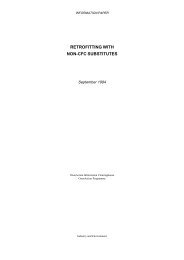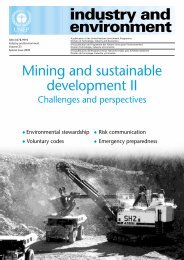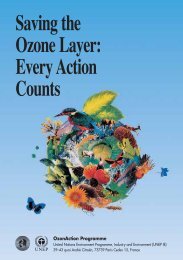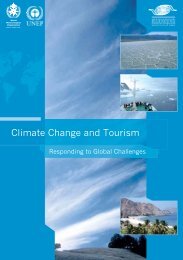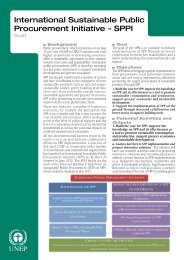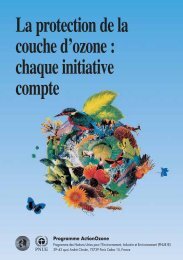industry and environment - DTIE
industry and environment - DTIE
industry and environment - DTIE
Create successful ePaper yourself
Turn your PDF publications into a flip-book with our unique Google optimized e-Paper software.
N e w s<br />
plagued industrialized countries over the past century,”<br />
says Dr. Lee Schipper, EMBARQ’s research<br />
director. “This project presents forward-thinking<br />
city governments with the opportunity to get it<br />
right as they develop what will soon be the largest<br />
transport markets on the planet.” Established in<br />
2002 with the support of the Shell Foundation,<br />
EMBARQ -The World Resources Institute Center<br />
for Transport <strong>and</strong> the Environment acts as a<br />
catalyst for socially, financially <strong>and</strong> <strong>environment</strong>ally<br />
sound solutions to urban transport problems.<br />
It is currently engaged in sustainable transport<br />
planning projects in Mexico City <strong>and</strong> Shanghai,<br />
two of the world’s largest cities, which have a population<br />
of 18 <strong>and</strong> 15 million people, respectively.<br />
For more information, contact: Adlai J. Amor,<br />
Media Director, World Resources Institute (WRI),<br />
10 G. Street, NE, Washington, DC 22203, USA,<br />
E-mail: aamor@wri.org.<br />
◆<br />
Mediterranean freshwater<br />
threatened<br />
Tourism is damaging freshwater in the Mediterranean<br />
basin, while growing water dem<strong>and</strong> for<br />
golf courses, hotels <strong>and</strong> aquaparks will further<br />
strain resources, says the <strong>environment</strong>al group<br />
WWF in its recent report Freshwater <strong>and</strong> Tourism<br />
in the Mediterranean. A hotel visitor uses on average<br />
one-third more water than a local inhabitant.<br />
Annual water consumption by a golf course is<br />
equivalent to that of a city of 12,000 inhabitants.<br />
“The tourism <strong>industry</strong> depends on water, <strong>and</strong> at<br />
the moment it is destroying the very resource it<br />
needs,” said Holger Schmid of WWF’s Mediterranean<br />
freshwater programme. The damage<br />
includes pollution, shrinking of coastal wetl<strong>and</strong>s<br />
that are tourist attractions (<strong>and</strong> havens for endangered<br />
species of animals <strong>and</strong> plants) <strong>and</strong> tapping<br />
of non-renewable groundwater in some regions.<br />
The problem is compounded by the fact the peak<br />
summer season for tourists coincides with the period<br />
when agricultural irrigation needs are greatest.<br />
The number of tourists heading for Mediterranean<br />
coastlines is expected to be between 235<br />
<strong>and</strong> 355 million per year by 2025, or roughly double<br />
1990 levels. On Spain’s Costa Brava, a<br />
favourite destination for visitors from Northern<br />
Europe, the population of 27 urban areas jumps<br />
from 150,000 in winter to 1.1 million in summer,<br />
causing water dem<strong>and</strong> to surge. On Cyprus,<br />
where water resources are already very tight, eight<br />
golf courses are under construction.<br />
WWF says local authorities tend to tackle the<br />
booming dem<strong>and</strong> for water by increasing supply,<br />
which is not sustainable in the long term. Governments<br />
are forced to look for increasingly drastic<br />
<strong>and</strong> costly measures to obtain large quantities of<br />
water in arid regions. WWF cites a Euro 3.8-billion<br />
(US$ 4.58 billion) Spanish plan to divert<br />
water from the Ebro River in the fertile north to<br />
the dry southeast.<br />
The WWF report contains a long list of ways<br />
that tourists, hotels <strong>and</strong> governments could cut<br />
water consumption, from turning off the tap<br />
while shaving to choosing drought-resistant native<br />
plants for l<strong>and</strong>scaping.<br />
For more information, see: www.p<strong>and</strong>a.org/ downloads/europe/medpotourismreportfinal_ofnc.pdf.<br />
◆<br />
Generating energy from<br />
rapeseed in the UK<br />
The world’s first commercial venture to generate<br />
electricity from rapeseed is planned in northern<br />
Engl<strong>and</strong>. Production is set to begin in July of next<br />
year. The pilot power plant at Great Driffield,<br />
Yorkshire, will burn oil extracted from rapeseed<br />
grown by local farmers, generating an initial<br />
1 megawatt of electricity (enough to power 1000<br />
homes). If successful, the scheme will be extended<br />
to several former collieries that already have turbines<br />
capable of producing electricity <strong>and</strong> direct<br />
access to the national power grid. Rapeseed,<br />
whose bright yellow flowers are part of the spring<br />
l<strong>and</strong>scape, is being used across Europe to make<br />
“biodiesel”, which is added to petroleum-based<br />
fuels. However, this will be the first time the crop<br />
is harnessed commercially for electricity.<br />
The Swiss-based agrochemicals group Syngenta<br />
is providing seed for the project. Farmers will sign<br />
a contract to furnish harvested crops to Springdale<br />
Energy, a local firm, which will run the power<br />
plant. The electricity generated will be sold on to<br />
SmartestEnergy, an independent energy trader that<br />
is part of Japan’s Marubeni group. The programme<br />
involves an initial 4000 hectares of crops. Andrew<br />
Coker, a spokesman for Syngenta, said the project<br />
was the first of its kind. However, he noted that<br />
there are some non-commercial schemes in operation,<br />
including a subsidized rapeseed power plant<br />
in the Reichstag, the German Parliament building.<br />
Until now, schemes using “green” or renewable<br />
sources of fuel for electricity have focused on burning<br />
straw or biomass crops, such as willow coppice.<br />
Governments around the world are under pressure<br />
to provide sustainable energy sources to meet their<br />
commitments under the Kyoto Protocol. In the<br />
United Kingdom this requires 3-5% of electricity<br />
to be generated from renewable sources by 2010.<br />
For more information, see www.syngenta.com.◆<br />
European forum on CSR<br />
makes recommendations<br />
At the end of a 20-month European Commission<br />
forum, business leaders have agreed that social <strong>and</strong><br />
<strong>environment</strong>al issues are a key part of modern<br />
business, but that corporate social responsibility<br />
(CSR) should not be a legal obligation. At the<br />
forum’s half-way point, whether principles should<br />
be m<strong>and</strong>atory or voluntary was the main bone of<br />
contention between business, trade unions <strong>and</strong><br />
NGOs.<br />
The forum’s report, European Multistakeholder<br />
Forum on CSR – Final Results <strong>and</strong> Recommendations,<br />
identifies barriers to the wide diffusion of<br />
CSR, especially in the case of small <strong>and</strong> medium<br />
enterprises (SMEs). These include scarcity of<br />
information <strong>and</strong> support, the “steep learning<br />
curve” facing any company that wants to take<br />
account of social <strong>and</strong> <strong>environment</strong>al concerns,<br />
<strong>and</strong> the unfamiliar language often used by CSR<br />
proponents.<br />
Nine recommendations are made, ranging from<br />
the establishment of a web site for all interested<br />
parties to including CSR in the curriculum of business<br />
schools <strong>and</strong> universities. In addition, companies<br />
should be encouraged to report on their CSR<br />
experiences <strong>and</strong> make this information freely available.<br />
EU Enterprise Commissioner Erkki Liikanen,<br />
who said the report’s conclusions are in line<br />
with Commission thinking, added that “it is also<br />
healthy that the report points to the boundaries of<br />
the CSR concept <strong>and</strong> to the limits of what it can<br />
achieve. CSR is only one instrument among others<br />
to achieve sustainable development outcomes.” To<br />
this end, he said, CSR policies should be integrated<br />
with broader efforts to promote economic,<br />
social <strong>and</strong> <strong>environment</strong>al progress. The responsibility<br />
for this cannot just be left with businesses,<br />
but should also fall to public authorities.<br />
Forum members have suggested a review meeting<br />
in two years, which would focus on putting the<br />
recommendations into practice. The European<br />
Commission will issue a communication on CSR<br />
before the end of this year. In September it will also<br />
begin a campaign intended to boost awareness<br />
among SMEs.<br />
For more information, see: www.europa.eu.int/<br />
comm/enterprise/csr/documents/29062004/EMSF_<br />
final_report.pdf.<br />
◆<br />
UNEP Industry <strong>and</strong> Environment April – September 2004 ◆ 77



